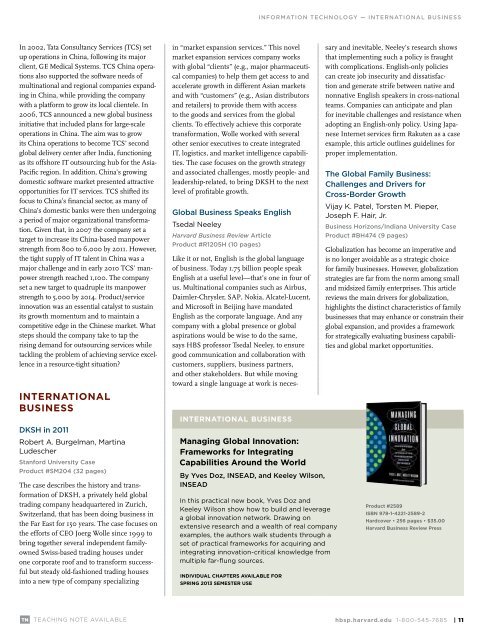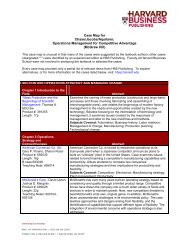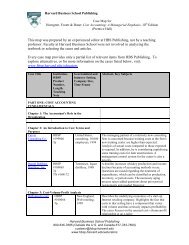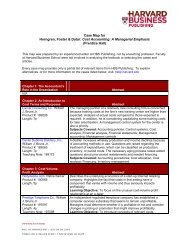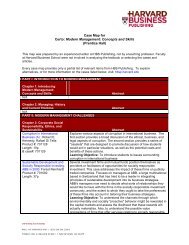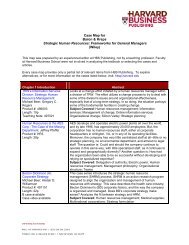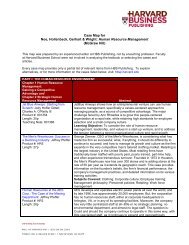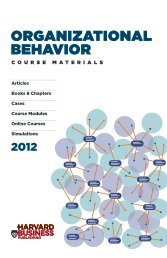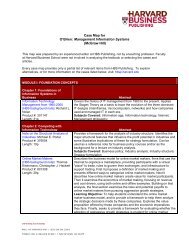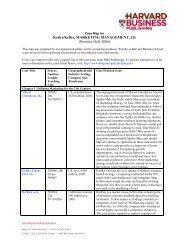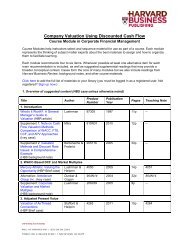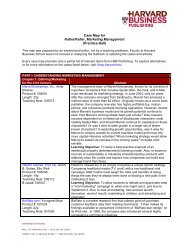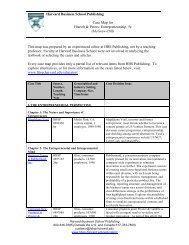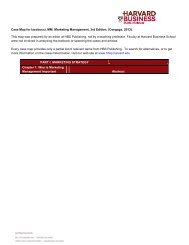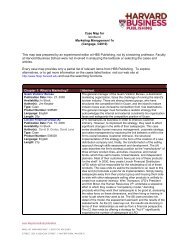teAcHing MATErIAlS - Harvard Business School Press
teAcHing MATErIAlS - Harvard Business School Press
teAcHing MATErIAlS - Harvard Business School Press
You also want an ePaper? Increase the reach of your titles
YUMPU automatically turns print PDFs into web optimized ePapers that Google loves.
In 2002, Tata Consultancy Services (TCS) set<br />
up operations in China, following its major<br />
client, GE Medical Systems. TCS China operations<br />
also supported the software needs of<br />
multinational and regional companies expanding<br />
in China, while providing the company<br />
with a platform to grow its local clientele. In<br />
2006, TCS announced a new global business<br />
initiative that included plans for large-scale<br />
operations in China. The aim was to grow<br />
its China operations to become TCS’ second<br />
global delivery center after India, functioning<br />
as its offshore IT outsourcing hub for the Asia-<br />
Pacific region. In addition, China’s growing<br />
domestic software market presented attractive<br />
opportunities for IT services. TCS shifted its<br />
focus to China’s financial sector, as many of<br />
China’s domestic banks were then undergoing<br />
a period of major organizational transformation.<br />
Given that, in 2007 the company set a<br />
target to increase its China-based manpower<br />
strength from 800 to 6,000 by 2011. However,<br />
the tight supply of IT talent in China was a<br />
major challenge and in early 2010 TCS’ manpower<br />
strength reached 1,100. The company<br />
set a new target to quadruple its manpower<br />
strength to 5,000 by 2014. Product/service<br />
innovation was an essential catalyst to sustain<br />
its growth momentum and to maintain a<br />
competitive edge in the Chinese market. What<br />
steps should the company take to tap the<br />
rising demand for outsourcing services while<br />
tackling the problem of achieving service excellence<br />
in a resource-tight situation?<br />
internAtionAl<br />
<strong>Business</strong><br />
DKSH in 2011<br />
Robert A. Burgelman, Martina<br />
Ludescher<br />
Stanford University Case<br />
Product #SM204 (32 pages)<br />
The case describes the history and transformation<br />
of DKSH, a privately held global<br />
trading company headquartered in Zurich,<br />
Switzerland, that has been doing business in<br />
the Far East for 150 years. The case focuses on<br />
the efforts of CEO Joerg Wolle since 1999 to<br />
bring together several independent familyowned<br />
Swiss-based trading houses under<br />
one corporate roof and to transform successful<br />
but steady old-fashioned trading houses<br />
into a new type of company specializing<br />
tn TEAChiNG NOTE AVAiLABLE<br />
in “market expansion services.” This novel<br />
market expansion services company works<br />
with global “clients” (e.g., major pharmaceutical<br />
companies) to help them get access to and<br />
accelerate growth in different Asian markets<br />
and with “customers” (e.g., Asian distributors<br />
and retailers) to provide them with access<br />
to the goods and services from the global<br />
clients. To effectively achieve this corporate<br />
transformation, Wolle worked with several<br />
other senior executives to create integrated<br />
IT, logistics, and market intelligence capabilities.<br />
The case focuses on the growth strategy<br />
and associated challenges, mostly people- and<br />
leadership-related, to bring DKSH to the next<br />
level of profitable growth.<br />
Global <strong>Business</strong> Speaks English<br />
Tsedal Neeley<br />
<strong>Harvard</strong> <strong>Business</strong> Review Article<br />
Product #R1205H (10 pages)<br />
Like it or not, English is the global language<br />
of business. Today 1.75 billion people speak<br />
English at a useful level—that’s one in four of<br />
us. Multinational companies such as Airbus,<br />
Daimler-Chrysler, SAP, Nokia, Alcatel-Lucent,<br />
and Microsoft in Beijing have mandated<br />
English as the corporate language. And any<br />
company with a global presence or global<br />
aspirations would be wise to do the same,<br />
says HBS professor Tsedal Neeley, to ensure<br />
good communication and collaboration with<br />
customers, suppliers, business partners,<br />
and other stakeholders. But while moving<br />
toward a single language at work is neces-<br />
internAtionAl <strong>Business</strong><br />
managing global innovation:<br />
frameworks for integrating<br />
capabilities Around the world<br />
By Yves Doz, INSEAD, and Keeley Wilson,<br />
INSEAD<br />
in this practical new book, Yves Doz and<br />
Keeley Wilson show how to build and leverage<br />
a global innovation network. Drawing on<br />
extensive research and a wealth of real company<br />
examples, the authors walk students through a<br />
set of practical frameworks for acquiring and<br />
integrating innovation-critical knowledge from<br />
multiple far-flung sources.<br />
individuAl cHApters AvAilABle for<br />
spring 2013 semester use<br />
INFORMATION TECHNOLOGY — INTERNATIONAL BUSINESS<br />
sary and inevitable, Neeley’s research shows<br />
that implementing such a policy is fraught<br />
with complications. English-only policies<br />
can create job insecurity and dissatisfaction<br />
and generate strife between native and<br />
nonnative English speakers in cross-national<br />
teams. Companies can anticipate and plan<br />
for inevitable challenges and resistance when<br />
adopting an English-only policy. Using Japanese<br />
Internet services firm Rakuten as a case<br />
example, this article outlines guidelines for<br />
proper implementation.<br />
The Global Family <strong>Business</strong>:<br />
Challenges and Drivers for<br />
Cross-Border Growth<br />
Vijay K. Patel, Torsten M. Pieper,<br />
Joseph F. hair, Jr.<br />
<strong>Business</strong> Horizons/Indiana University Case<br />
Product #BH474 (9 pages)<br />
Globalization has become an imperative and<br />
is no longer avoidable as a strategic choice<br />
for family businesses. However, globalization<br />
strategies are far from the norm among small<br />
and midsized family enterprises. This article<br />
reviews the main drivers for globalization,<br />
highlights the distinct characteristics of family<br />
businesses that may enhance or constrain their<br />
global expansion, and provides a framework<br />
for strategically evaluating business capabilities<br />
and global market opportunities.<br />
product #2589<br />
isBn 978-1-4221-2589-2<br />
Hardcover • 256 pages • $35.00<br />
<strong>Harvard</strong> <strong>Business</strong> review press<br />
hbsp.harvard.edu 1-800-545-7685 | 11


